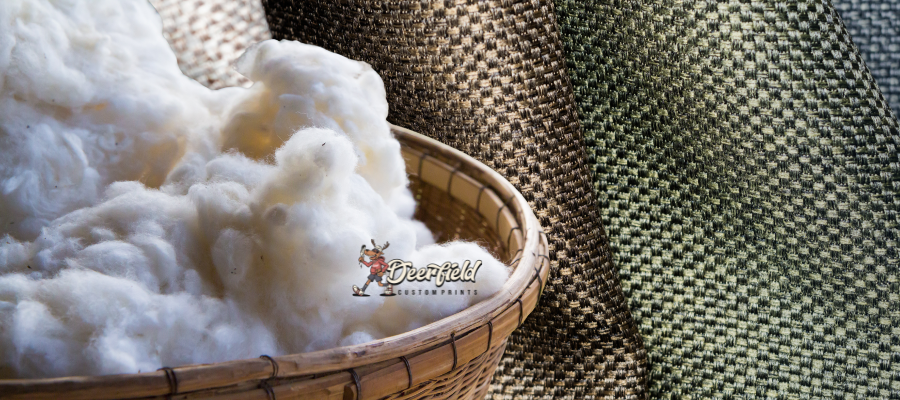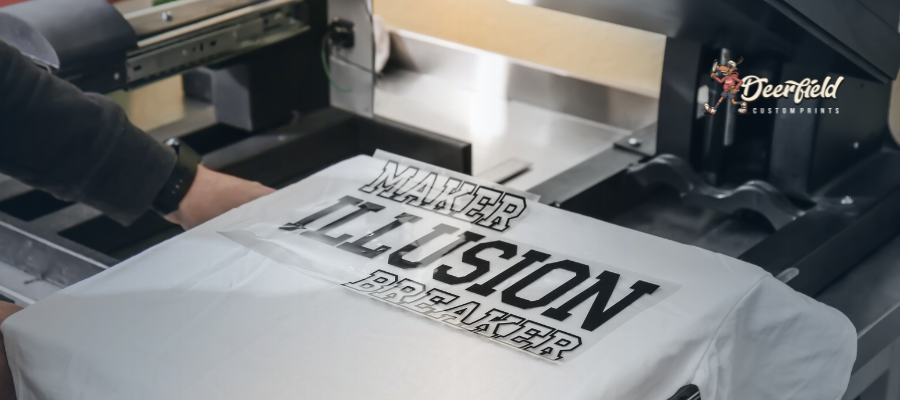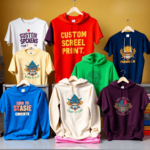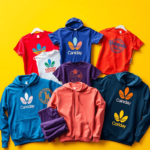
When it comes to selling t-shirts online, the materials you choose can make or break your business. It influences the visual appeal of your designs, the tactile experience of your shirts, and the overall durability. Opting for high-quality fabric not only boosts customer satisfaction but also contributes to increased sales.
On the other side, a poor fabric choice could cost you valuable business opportunities. We will share insights to help you navigate the process of selecting the perfect fabric for your print-on-demand business.
Finest Options for T-shirt Materials

When it comes to t-shirt materials, the spotlight often falls on three key players: cotton, polyester, and the dynamic duo of cotton/polyester blends. Each material brings its unique set of advantages and drawbacks to the table.
Cotton leads in comfort, eco-friendliness, and affordability, while polyester excels in quick drying and durability. The blend seamlessly marries the best of both worlds, though not without its nuances.
Cotton
Cotton is all-natural, soft as a dream, and brings that comfy, eco-friendly vibe. It dominates the t-shirt world, offering a plush feel, green cred, and a pocket-friendly tag. Yet, it’s got a thing for moisture, taking its time to dry.
Beware of wrinkles and potential shrinkage on the laundry stage. Over time, it may show a few battle scars with fading. But if you’re all about timeless comfort, sustainability, and a friendly price, cotton is your loyal companion in the realm of custom tees.
Types of Cotton
Ringspun Cotton
- Smooth, soft, and durable cotton spun through a specific technique.
- Known for its durability due to the tight twist of the fibers.
- Often used in premium T-shirts and other apparel for a comfortable feel.Combed and
Ringspun Cotton
- Cotton fibers undergo additional combing before spinning for enhanced softness.
- In addition to the ringspun process, combed cotton undergoes an extra step where short fibers are removed before spinning.
- This further enhances softness and strength, making it a preferred choice for high-quality garments.
Organic Cotton
- Grown without synthetic pesticides or fertilizers, embracing eco-friendly vibes.
- Grown without the use of synthetic pesticides or fertilizers, promoting environmental sustainability.
- The cultivation process typically involves natural methods, such as crop rotation and composting.
Slub Cotton
- Cotton with slight lumps for a textured, vintage look.
- Characterized by slight lumps or irregularities in the yarn, creating a textured and vintage appearance.
- The unique texture of slub cotton adds visual interest to garments, making them stand out.
Pima Cotton
- High-quality, long-staple cotton is known for its luxurious feel.
- A type of extra-long staple cotton known for its softness, durability, and luxurious feel.
- Often used in high-end bed linens, clothing, and other premium textiles.
Pique Cotton
- Cotton fabric with a textured weaving pattern is commonly seen in polo shirts.
- Features a distinctive textured weaving pattern, commonly seen in polo shirts.
Pros:
Cotton stands out as a favored choice for t-shirts, boasting several advantages:
- Soft: Cotton t-shirts offer a pleasant softness to the touch, ensuring a comfortable wearing experience.
- Comfortable: The inherent comfort of cotton makes it a go-to fabric for t-shirts, providing wearers with a comfortable feel.
- Gentle on the Skin: Cotton’s gentle texture makes it a friendly choice for skin, avoiding any irritation or discomfort.
- Breathable: Cotton t-shirts allow for excellent breathability, ensuring they don’t cling uncomfortably, providing a relaxed fit.
- Heavier Feel: Cotton t-shirts have a heavier feel compared to polyester, which is provided to those who prefer a substantial shirt.
- Durability Defined: Renowned for its validity, t-shirts made from cotton are durable and capable of withstanding everyday wear and tear.
- Eco-Friendly Choice: Cotton is biodegradable, with organic cotton standing out as a particularly environmentally friendly option.
Cons:
However, cotton does come with its share of drawbacks:
- Moisture Hangs On: Cotton t-shirts have a tendency to retain moisture, leading to a slower drying time after washing.
- Wrinkle and Shrinkage Risks: While shrinking can somewhat mitigate this, cotton t-shirts may be more prone to wrinkles and shrinkage.
- Fading Colors: Over time, colors on cotton t-shirts may fade, affecting the vibrancy of the garment.
- Stain Susceptibility: Cotton t-shirts are more susceptible to staining and damage than other fabrics.
- Weight Factor: For those seeking a lighter shirt, the weight of cotton may be considered a downside, depending on personal preferences.
Polyester
Polyester is an imitative fabric derived from plastic, offering many advantages. Its built-in water repellency makes it resistant to moisture, stains, odors, wrinkles, and shrinking while also ensuring a quick drying process. The fabric’s moisture-wicking feature efficiently transports sweat away from the skin, facilitating rapid evaporation. Polyester stands out in the realm of printing methods, proving to be an optimal choice for direct-to-garment (DTG) and sublimation techniques.
Pros:
Polyester makes clear several advantages:
- Moisture-Wicking Marvel: Its moisture-wicking properties efficiently draw sweat away from the body, contributing to a comfortable and dry experience.
- Quick-Drying: Polyester t-shirts stand out for their rapid drying, ensuring a swift recovery after moisture exposure.
- Stain and Odor Resistance: Unlike some fabrics, polyester doesn’t easily absorb stains and odors, maintaining a fresh and clean appearance over time.
- Wrinkle and Shrinkage Resistance: Polyester t-shirts boast resistance to wrinkling and shrinking, maintaining a neat and consistent fit.
Cons:
Despite its merits, polyester also has its drawbacks:
- Higher Price Tag: Polyester t-shirts generally come with a higher cost compared to their cotton counterparts.
- Breathability Challenges: While excelling in moisture resistance, polyester doesn’t breathe as effectively as cotton, potentially affecting overall comfort.
- Clinginess Concerns: Polyester t-shirts may have a tendency to cling, which can be a consideration for some wearers.
- Skin Irritation Potential: The fabric can irritate some individuals’ skin, impacting the overall comfort of the garment.
- Non-Biodegradable Nature: T-shirts made from polyester aren’t biodegradable, causing environmental challenges.
- Printing Challenges: Applying silk screen printing to polyester can be challenging, making it less compatible with certain printing methods.
Cotton and Polyester Blend Material

Blended t-shirts crafted from a mix of cotton and polyester offer a unique combination of benefits and challenges. Drawing on the softness and comfort of cotton, these shirts also emulate the quick-drying, wrinkle-resistant, and durable qualities associated with polyester. They come with a more budget-friendly price tag than their pure polyester counterparts.
However, cotton/polyester blends may exhibit traits such as clinginess and potential skin irritation. While supporting a range of printing options, they are more limited compared to pure cotton.
It’s important to note that these blends tend to be pricier than pure cotton options. Also, it blends with a higher cotton content may carry a slightly increased risk of shrinking compared to pure polyester garments.
Varieties of Cotton and Polyester Blend T-shirts:
90% Cotton / 10% Polyester:
- This blend offers a soft and breathable fabric.
- Less prone to shrinkage compared to pure cotton but not as shrink-resistant as high-polyester blends.
65% Polyester / 35% Cotton:
- The most popular blend balances shrink resistance from polyester and cost offset from cotton.
- Widely used for sports and exercise, but it may cost more than pure cotton and can exhibit clinging and skin irritation due to its higher polyester content.
60% Polyester / 40% Cotton:
- A variation with less polyester and more cotton than the 65%/35% blend makes it more prone to shrinkage while being cost-effective.
50% Polyester / 50% Cotton:
- An equal blend offering increased breathability compared to 65%/35% blends.
- A popular choice for sports and exercise.
52% Cotton / 48% Polyester:
- A variation on the 50%/50% blend, with slightly more cotton for enhanced breathability and cost savings.
25% Cotton / 50% Polyester / 25% Rayon (Tri-blend):
- This blend introduces rayon, a semi-synthetic fiber, sharing cotton and polyester advantages. Some rayon types imitate silk properties, providing a smooth feel fit.
- Tri-blends can cling and irritate the skin like polyester but offer unique comfort features.
Pros:
- Economical Blend: T-shirts crafted from cotton/polyester blends seamlessly combine the best fabrics, delivering a cost-effective option compared to pure polyester alternatives.
- Soft Comfort: Enjoy the softness and comfort mindful of cotton with blended-fabric t-shirts.
- Quick-Drying and Durable: These t-shirts showcase the quick-drying skill, shrink resistance, and durability characteristic of polyester, ensuring reliable and long-lasting wear.
Cons:
- Cost Consideration: While offering a budget-friendly compromise, t-shirts made from cotton/polyester blends may still sustain a higher cost than their pure cotton counterparts.
- Shrinkage Potential: Blends with higher cotton content may be prone to shrinkage, a factor to consider in garment care.
- Non-Biodegradable Nature: Unfortunately, blended fabrics lack biodegradability, posing environmental challenges.
- Printing Compatibility: Cotton/polyester blends with a higher polyester ratio may not be the ideal canvas for silk-screen printing.
Selecting the Right Choice for Ideal T-Shirt Materials

Wondering how to make the perfect choice for your company’s t-shirts? Consider these key factors:
Comfort
- Ever thought about the feel of the fabric against your skin? Opt for something that’s not just a shirt but a comfort experience.
- Cotton typically offers more comfort for most individuals due to its soft and breathable nature. Some people might experience skin irritation with polyester or cotton/polyester blends.
Weight
- Light as a feather or a bit more substance? Think about the weight of the fabric – it plays a big role in how your t-shirts will feel.
- Cotton and polyester fabrics are available in various thicknesses and weights. When exploring t-shirt options online, you’ll often find information indicating whether the fabric is thick or thin.
Fit
- Are you into the relaxed vibes or a more tailored look? The fabric you choose can make or break the fit of your t-shirts.
- Polyester tends to experience less shrinkage than cotton, allowing it to maintain its original fit more effectively. However, it does have a tendency to cling.
Longevity
- T-shirts that withstand the test of time – who wouldn’t want that? Check out the fabric’s durability for t-shirts that go the distance.
- Due to its resistance to moisture absorption and shrinking, polyester typically exhibits greater longevity than cotton. Various types of cotton offer varying levels of durability, with heavier cotton fabrics generally retaining their durability better than lighter counterparts.
Climate Sustainability
- Is your fabric cool and breathable or comfortable and warm? Consider how well it aligns with different climates.
- Cotton emerges as a more environmentally friendly option compared to polyester.
Cost
- Budget matters, but so does quality. Find that sweet spot where your chosen fabric meets your financial goals without compromising on the awesomeness of your t-shirts.
- Polyester comes with a higher price tag compared to standard cotton. One can explore the option of cotton/polyester blends to address cost considerations.
Design excellent custom t-shirts with Deerfield Custom Prints!
When deciding on the perfect fabric for your clothing brand’s t-shirts, your primary choices revolve around cotton, polyester, and cotton/polyester blends. Cotton brings softness, comfort, and eco-friendliness, supporting various printing methods. However, it has a slower drying time and is more prone to shrinkage.
Polyester, on the other hand, offers quick drying and durability, but it comes at a higher cost, with potential skin irritation and less eco-friendly aspects. Cotton/polyester blends merge cotton’s softness with polyester’s moisture resistance, delivering benefits at a lower cost but sharing drawbacks like skin irritation and clinging.
Consider comfort, weight, fit, longevity, climate sustainability, and cost when selecting t-shirt fabrics. The evaluation depends on your market and needs, as consumer segments prefer various fabrics. There’s no one-size-fits-all solution, so tailor your choices to your customers.
We simplify meeting your customers’ needs by providing high-quality cotton, polyester and blended t-shirts for on-demand printing through our direct-to-garment (DTG) services. We enable global local production, reaching customers faster while reducing waste, costs, and carbon emissions. Our selection includes eco-friendly organic cotton t-shirts, aligning with our commitment to sustainability.
Common Questions About T-Shirt Materials

What’s the best quality for t-shirts?
Answer: Cotton delivers quality through unmatched comfort with its soft and breathable characteristics. On the other hand, polyester takes the lead in terms of quick-drying capabilities and long-lasting durability. The definition of quality varies based on the priorities of your market segments. If your customers prioritize comfort, highlight the softness and breathability of cotton.
Which T-Shirt Materials Offers the Ultimate Comfort?
Answer: For the coziest feel, go for t-shirts made of pure cotton or cotton blends. Pima cotton is the comfiest, and tri-blend fabrics also offer top-notch comfort.
Which T-Shirt Materials is Least Prone to Shrinking?
Answer: Polyester is the go-to for avoiding shrinkage in t-shirts because it’s excellent at repelling moisture. If you want both moisture resistance and the comfort of cotton, go for a cotton/polyester blend – it shrinks less than pure cotton.
Final Thoughts
Craft superior custom t-shirts with us! Explore our high-quality cotton, polyester, and blended fabrics for on-demand printing. Prioritize comfort, durability, and eco-friendliness to meet your customer’s needs.
Ready to turn those fabric dreams into reality? Contact us for any lingering questions or to dive into a purchase. Your ideal t-shirt is just a message away. Let’s make your wardrobe dreams come true – contact us now!





